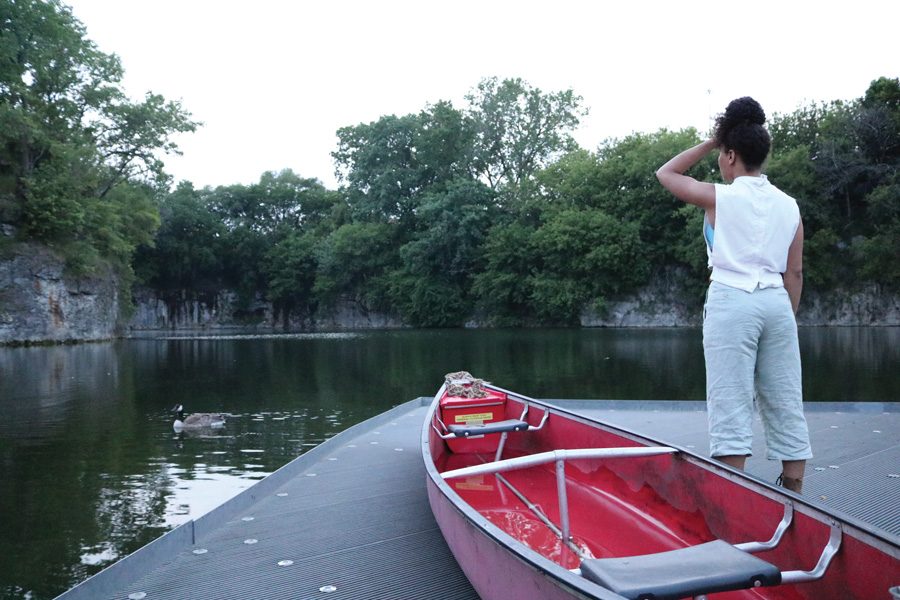Northwestern alumnae take on Illinois abortion laws in new participatory play
An actor rehearses for “This Boat Called My Body” in Chicago’s Palmisano Park. The show focuses on stories of Illinois adolescents who have grappled with issues surrounding abortion.
May 30, 2018
During her time at Northwestern, Nik Zaleski (Communication ’08) took a health activism class as part of her second major in gender studies. In one lecture, she said, the professor showed a video of a live abortion procedure. Three women fainted.
“I remember thinking, ‘This is not the conversation I wish to have about abortion,’” Zaleski said. “I wish to have one where people feel safe and comfortable.”
As a co-writer and co-director of “This Boat Called My Body,” Zaleski said she tries to do just that.
The play focuses on stories of adolescents throughout Illinois who have grappled with the many issues, both personal and legal, that surround access to abortion. It is presented by For Youth Inquiry, the participatory theater company of the Illinois Caucus for Adolescent Health, and runs Thursday through June 17 in Chicago’s Palmisano Park.
The play was written last summer, Zaleski said, by a team of writers who “collaged” the stories into one character: Jane. The name was chosen as a reference to the Jane Collective, an underground abortion service in Chicago that operated in the early 1970s while abortion was illegal in the United States.
Alyssa Vera Ramos (Communication ’11), artistic director of FYI and the Arts Justice Organizer of ICAH, said she found the collaboration between the artists and young people who have dealt with abortion to be “gorgeous.” She recalled when two people who had told their stories to ICAH came into the rehearsal room to work with the playwrights, and retold versions of their experiences live.
“That was very intimate and public because these folks were trusting us with their stories,” Ramos said. “It was such a fascinating exercise in empathy and trust to be able to say that we really tried to honor these folks’ lived experiences.”
Zaleski said the play uses the metaphor of Jane’s body as a boat to convey the “islands” young people must travel to for unfettered access to abortion, and what can help them “sail” there. The play is performed in Palmisano Park next to a pond, Zaleski said, and the audience members are invited to push a literal boat into the pond to help Jane “get into her body” and receive the medical care she needs.
The show was a response to the Illinois Parental Notice of Abortion Act passed in 2013, which requires that health care providers notify an adult family member of a minor’s intent to get an abortion 48 hours before the procedure, Zaleski said.
Zaleski said she hopes the physical action of helping Jane push the boat allows audience members to realize they are not alone in dealing with issues surrounding abortion and to become inspired to push for legislative change.
ICAH executive director Tiffany Pryor said there is a call to action during the play, which asks audience members to sign a petition or write letters to their legislators asking for a repeal of the law. Most of all, she said, she wants audience members to realize the “harsh waters” young people face when trying to have an abortion.
“How are we creating space for young people to have safe conversations with the adults in their lives, and how can the adults in their lives support them through this?” Pryor said. “That’s what I want people to walk away with.”
For many members of ICAH and FYI, including Zaleski, the significance of the play extends beyond one piece of legislation. Zaleski said due to an abusive relationship, her mother underwent multiple abortions, without which Zaleski herself would not be alive.
“I know what it would have meant for my mother to carry the pregnancies to term in that harmful relationship she was in before she met my dad, and that she wouldn’t have been able to go on and live the life she dreamed of for herself,” Zaleski said. “To me, (abortion) feels like one of the most fundamental rights that any person should be able to access.”
Email: [email protected]
Twitter: @charwalsh_


